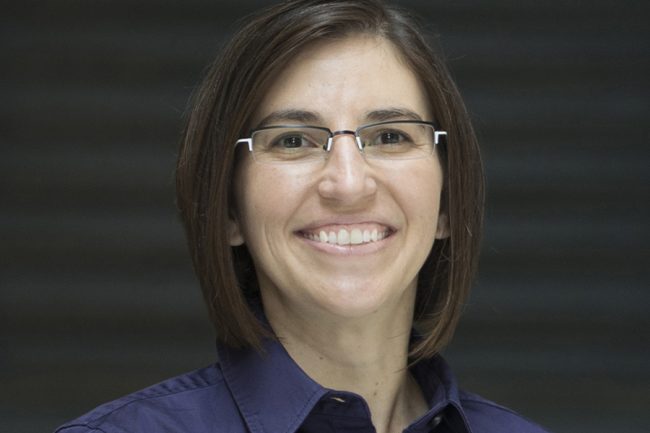ByTyler Irving

Professor Dionne Aleman (MIE) was recently appointed U of T Engineering's Associate Dean, Cross-Disciplinary Programs. (Photo: Pam Walls)
Mechanical, electrical, chemical, civil any undergraduate student can recite the traditional disciplines of engineering. But increasingly, the leading edge of innovation cuts across these arbitrary divisions, creating new fields such as robotics or artificial intelligence. Professor Dionne Aleman (MIE) wants to help future engineers embrace this change.
"My own research is about applying industrial engineering to the unlikely area of medical and healthcare decision-making," she says. "Working in multidisciplinary environments requiring specialized knowledge is home to me, and I think engineers have value to add to every industry."
Aleman was recently appointed U of T Engineering's Associate Dean, Cross-Disciplinary Programs, succeeding Professor Bryan Karney (CivMin), who held the role for the previous 12 years. Aleman is excited about the impact she can have on the next generation.
"Our engineering students are hungry to learn more and tailor their studies towards their individual interests and career aspirations," she says. "There is a fast-increasing awareness that engineers are successful in a wide variety of careers broader than what would be traditionally expected from their major."
U of T Engineering currently offers more than 20 cross-disciplinary programs of study. All these programs are designed to be within easy reach and can be completed by selecting appropriate electives within existing engineering course requirements. Engineering minors require three full credits, while certificates require three half-credits.
Students can choose from a wide range of topics: robotics, bioengineering, artificial intelligence, business, environmental engineering and even music performance. Over the past ten years, the proportion of graduating students completing at least one minor has increased from 19% to 48%, and more than two-thirds of students complete at least one minor or certificate, with many completing more than one.
"Some of our most popular cross-disciplinary programs are the Artificial Intelligence minor, the Robotics & Mechatronics minor and the Engineering Business minor, which is led by our Institute for Studies in Transdisciplinary Engineering Education & Practice," says Aleman.
"These topics are in line with what is popular and hot in the world right now. Every industry is reaching into AI and machine learning to improve design, automation and decision-making, and our students know that and want to be a part of the movement.
"Similarly, robots are becoming more sophisticated and finding more uses, and lots of engineering students have entrepreneurial and management aspirations as well. These programs give them the tools they need to succeed."
Aleman says that what attracted her to the role was the ability to shape the future of the engineering profession.
"As a researcher, there's only so much multidisciplinary engineering infusion I can achieve, but in this role, I can open doors for hundreds upon hundreds of engineering students to go out into the world and make it a better place," she says.
"Cross-disciplinary programs are a perfect way to allow our students to gain knowledge and experience in unique areas that will allow them to start innovative careers immediately."
In the last decade, U of T Engineering has added six minors and seven certificates. Aleman says that there are even more planned for the coming years.
"My vision is to continue expanding our programs to reach more students and cover topics of growing interest," she says. "Specifically, we will broaden our scope to include graduate students, and assess our minor and certificate programs with respect to equity, diversity and inclusivity (EDI) to ensure our programs are accessible to all students."
"We're also looking at creating a new certificate in Public Health Engineering, which I think is particularly relevant given our collective experience with COVID-19. And there is much more in the works; stay tuned!"











